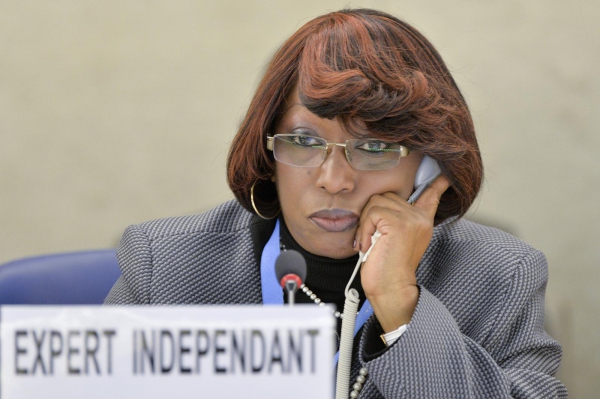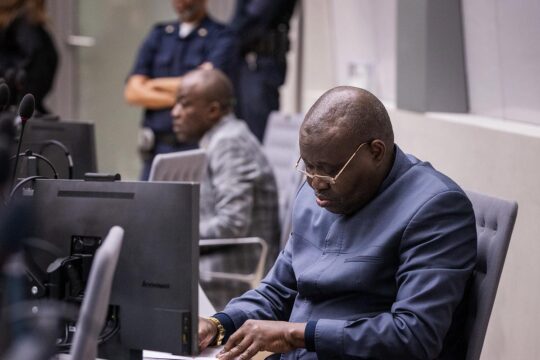Restoring a reliable, trustworthy justice system in the Central African Republic (CAR) involves overcoming many challenges. That was the unanimous conclusion of a June 28 meeting at the UN Human Rights Council in Geneva with participants including Marie-Thérèse Keita-Bocoum, independent expert on human rights in the CAR. Rehabilitation of the collapsed justice sector will, however, be impossible as long as there is continuing insecurity, caused by armed groups who seem to want to challenge the new, democratically elected government.
Participants at the meeting hailed the CAR’s adoption of a new constitution and the election of new president Faustin-Archange Touadéra. But they expressed concern at the recent upsurge of violence, especially in the south and east of the country.
While Marie-Thérèse Keita-Bocoum expressed satisfaction at the technical support and pertinent recommendations of the UN Human Rights Council, she also reminded the meeting that the human rights situation depends on security, and that the question of disarmament is key. Discussions on implementation of the DDR (Disarmament, Demobilization, and Reintegration) process are due to take place soon between President Touadera’s government and the UN mission in the CAR (MINUSCA). In an interview with JusticeInfo, the independent expert stressed the importance of disarmament. “Disarmament is essential, and it requires will on the part of everyone,” she said. “For that to happen, there needs to be discussion and a will to listen also to those who still want to arm themselves. The activities of those taking up arms must be reduced. The CAR is a sovereign State, it needs an army that can play its role to protect and reconcile people.”
The CAR’s representative to the UN in Geneva, Ambassador Léopold Samba, expressed a similar point of view. “The elements indispensable to the State are currently lacking, including the ability to deploy police on the ground,” he said. “If the State does not have an army worthy of its name, then people are free to take up arms.”
With regard to non-judicial truth-seeking mechanisms, the independent expert considers that it is not too early to think about them. But she again warned that such mechanisms – for example, a Truth and Reconciliation Commission – cannot be set up before security is re-established. If not, victims could lose trust in justice and decide to impose their own justice by taking up arms. She also warned that if there is no security, victims and witnesses will probably refuse to testify about grave human rights abuses.
Finally, she reminded the meeting that the right to information is a fundamental part of the reconciliation process, because justice cannot be promoted without communication. Media should not be limited to Bangui only, she said, and those that are strong like radio should be strengthened and encouraged, perhaps through funding support and training with one objective: credibility.
The Special Criminal Court
As well as proposed non-judicial measures, many have welcomed the government’s referral of the situation to the International Criminal Court in 2014 and are above all waiting impatiently for the operationalization of the Special Criminal Court approved by a law of 2015. According to Ambassador Léopold Samba, discussions on its operating budget for the next 18 months and the remuneration of national and international judges seem to be have been completed. But, says the independent expert, “funding for the five years of the Court’s operation, recruitment of the judges, security, availability of enough well-trained Central African lawyers and protection of victims and witnesses still pose big challenges”.
Many key players in the CAR think that as well as prosecuting suspected perpetrators of war crimes and crimes against humanity in the country, this Special Court could have a positive influence on the country’s own judicial system. But the CAR representative stresses that all this requires “human and financial resources as well as guaranteed support from the international community, without which this discussion will have no follow-up”.
Thérèse Keita-Bocoum agrees, adding that the CAR’s judicial system is “currently incapable of tackling impunity and fulfilling the needs of justice, hence the necessity to launch this Special Criminal Court”. “The whole judicial system needs to be rehabilitated,” she said. “The number of judges, currently only 180, needs to be increased, and they need better training. The judicial police must also be strengthened. At the moment, it is not possible for them to protect the people. The prisons and courts have been overrun by armed groups. What is at stake is the restoration of the whole judicial system.”
Sexual abuse by international forces
As if the crimes committed by Central Africans themselves were not enough, certain elements among the UN peacekeeping forces have committed abuses against children. Some national and international NGOs have called for an independent investigation, but Thérèse Keita-Bocoum thinks this should be dealt with under existing rules “even if they should perhaps be changed”. Despite the resignation announcement of UN whistle-blower Anders Kompass at the beginning of June, she believes the UN remains determined to prevent and punish such behaviour. However, with recent allegations of more child sexual abuse by UN forces in the central Kemo region, doubt continues about the real capacity of these international troops to protect the most vulnerable people.






